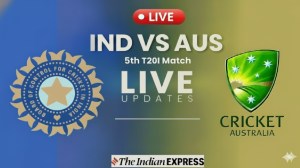The Fourth Republic in India
For a decade or more after the end of the Second World War, France suffered quick-change governments and an era of endemic instability. The...

For a decade or more after the end of the Second World War, France suffered quick-change governments and an era of endemic instability. The War had not only destroyed its Third Republic, replacing it with the Fourth Republic, but the end of the hostilities had also marginalised the great wartime leader, Charles de Gaulle, who sulked in the wings as his beloved country tottered from one coalition to another.
The fact that France was rapidly recovering from the damages inflicted by the protracted hostilities and the internal dissensions that they had brought about was of little consequence. What was important was that the French were tired of short duration regimes, coalitions of convenience and longed for the Grand Leader who would restore political stability by towering over the others in the Fifth Republic.
The resemblance between that situation and the one obtaining in India today is not merely coincidental. Like post-War France, India too is firmly in the era of coalitions. Not only is the polity fractured but so is society itself, leading V.P. Singh to proclaim that India itself is a coalition today. And, even as the economy more or less takes its own course under the sporadic guidance of the IMF as the French economy did with Marshall Plan aid, governments are coming and going with mind-numbing rapidity. The very constitution of the 11th Lok Sabha has made it clear that, even though it does not recognise it, India is practising its own Fourth Republic with Atal Behari Vajpayee, H.D. Deve Gowda, Inder Kumar Gujral going in and out through the revolving door even as potential leaders of the Fifth Republic like Jyoti Basu and V.P. Singh stand beyond the boundaries.
There is a difference between France and India, of course. Hegel had proclaimed that events and personalities come twice in history. With warranted irony, Marx added that they come the first time as tragedy and the second time as farce. That both these observations are true is apparent when we compare what is happening in India now with what happened in France.
France has gone through various phases of its politics. The First Republic founded after the French Revolution lasted only a few years before Napoleon proclaimed the First Empire. That too was short-lived and as Bonapartism met its Waterloo, the Second Republic was established. That went through different convolutions and led the somewhat ridiculous nephew of the Bonaparte to declare himself, Napoleon the Third, as head of the Second Empire.
The Franco-German War of 1870 ended that political phase and by bringing about the humiliation of La France established another regime altogether. In any event, as the twice-born Empire disappeared in face of the blood-and-iron policy of Count von Bismarck, France got its Third Republic, a populist formation which held democracy together till once again German armies, this time under Hitler, destroyed the French political arrangement. Fascism was assisted in its enterprise by the abject collaboration required an "imperial presidency" in the Fifth Republic under De Gaulle. Mitterrand and Chirac have perfected the Fifth Republic by seeing to it that even the cohabitation between a socialist or conservative president and a ministry of another persuasion does not disturb France.
While history repeats itself only ironically, geography is even more capricious. Thus, the political evolution of India cannot totally replicate that of France. And yet there are uncanny similarities. The First Republic of India under Jawaharlal Nehru was, almost inexorably, replaced by the First Empire during the Emergency under Nehru’s daughter and younger grandson. However, that Empire was mercifully short-lived and the Second Republic was established in 1977. That lasted through the Janata regime and even the first few years of Indira Gandhi’s second coming. It was only around 1983-84 that the arrogant imperial style, befitting a Second Empire, resurfaced and lasted till Rajiv Gandhi was secure of his overwhelming support base. In the middle of his reign, however, the imperial style was replaced by a nervousness characteristic of the scandal-ridden Third Republic. The 1996 elections seem to have put an end to that and heralded the beginning of India’s Fourth Republic, an era of coalitions, consensus-seeking and management of contradictions.
In fact, today it might appear we are still in the twilight zone between the fading away of the venal and, in the end, capitulationist Third Republic and the coalitional possibilities of a Fourth Republic. There is still the possibility of the demoralised Congress led by old and tired but still power-grasping leaders capitulating to and collaborating with the fascist forces of the Sangh Parivar much as the old men of Vichy snuggled up to Hitler’s storm-troopers. Thus, while the wishful have called for a Bonapartist military rule or a Gaullist alternative led by the unlikely P.A. Sangma or even Manmohan Singh or fantasise about Sonia Gandhi or her offspring dramatically entering the political arena, the fact is that such is the balance of political power at the moment that, at best, it is the Fourth Republic formation that will endure.
The electorate has made its intentions clear by rejecting the system that has existed up to now and only those politicians who are thick-skinned, singularly insensitive to democracy or so taken in by their own schemes and interests as to ignore the vox populi persist in putting one more patch on the irreparably tattered robes of the regime that has existed up to now. Thus, all attempts to keep the old system alive by sheer opportunistic manipulation are bound to fail even in the intermediate run. And the kind of shameful wheeling and dealing as has been indulged in by all parties in the last few days will only reinforce the sense of public revulsion.
Even holding the Fourth Republic together requires considerable finesse. Establishing the Fifth Republic is another matter altogether. By rejecting participation in the inevitably unstable and necessarily inefficient and perhaps even corrupt Fourth Republic, as of now, it is only V.P. Singh, the pre-eminent thinking politician, who has given a hint that it is time to start thinking about a Fifth Republic. His attempt to project the larger-than-life Jyoti Basu to the centrestage failed because it was premature. As in many earlier instances, V. P. Singh could once again have worked out the political scenario faster than anyone else.



- 01
- 02
- 03
- 04
- 05




























